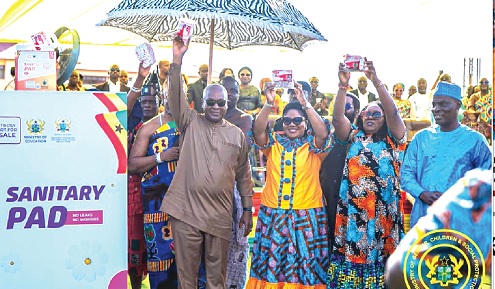A Ghanaian manufacturing firm, Nordiq Hygiene Care Industry, has produced and distributed six million sanitary pads under the government’s Free Sanitary Pads Initiative in a major step towards addressing period poverty.
The initiative, spearheaded by the Ministry of Education, aims to curb period-related absenteeism among adolescent girls and promote job creation through local industry.
Context
Studies show that more than 27 per cent of adolescent girls in the country miss between one and seven school days each month due to menstruation.
The fight to end period poverty received momentum, with Nordiq Hygiene Care, a Ghanaian firm leading the first phase of the initiative.
The industry has adopted a production strategy that balances efficiency with employment creation.
Instead of fully automating its packaging process, the company opted for manual sealing and packaging, a move that created over 300 temporary and permanent jobs.
Modus operandi
The Managing Director of Nordiq Hygiene Care Industry, Dina Safwan Shoueiry, told the Daily Graphic that the decision was intended to boost community employment, while ensuring all products meet strict hygiene and safety standards.
The manual process also benefited other local manufacturers, as Nordiq sourced its packaging materials from three Ghanaian factories, stimulating additional industrial activity and sustaining local supply chains.
To meet the government’s delivery target of six million pads within three months, the company’s factory, located within the Tema Free Zones enclave, operates 24 hours a day, aligning with the government’s 24-hour Economy policy.
Beyond economic impact, Nordiq maintained an inclusive employment policy, offering opportunities to persons with disabilities, including those with hearing and intellectual impairments.
Approximately 75 per cent of its workforce are women, reflecting the company’s commitment to gender equity and empowerment.
Ms Shoueiry described the project as more than a production contract, but part of a national mission to ensure menstrual health and education for all Ghanaian girls.
Affordable, accessible
A pack of sanitary pads currently costs the equivalent of over 10 per cent of a minimum-wage earner’s monthly income, pushing many low-income households into difficult choices.
The government’s initiative, therefore, aims to make sanitary pads affordable and accessible while ending menstrual-related absenteeism.
At the national launch of the initiative, President John Dramani Mahama reiterated the government’s commitment to ending period-linked absenteeism among schoolgirls.
The Minister of Education, Haruna Iddrisu, also emphasised the importance of supporting local manufacturing and job creation through the initiative.


